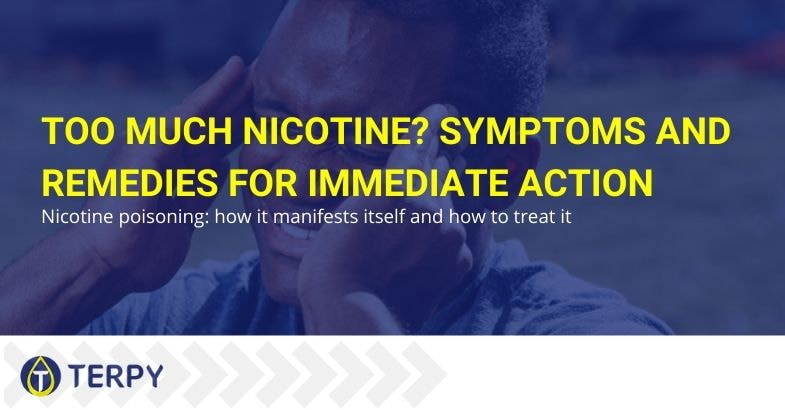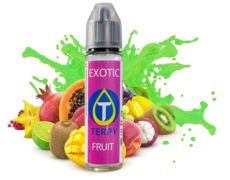Published on: 16/05/2022
Nicotine poisoning: how it manifests itself and how to treat it
Heavy smokers and vapers are in constant contact with nicotine and take it in day after day.
The characteristics of this molecule are now known to even the most casual smoker, and everyone knows the risks of daily consumption. It is certainly not the most harmful substance of all those present in cigarette smoke. Still, the risks associated with its consumption should not be underestimated, especially when exposed to very high doses.
Fortunately, nicotine intoxication is very rare when taken with simple common sense. Sometimes, however, carelessness, inattention and carelessness can expose a person to an excessive amount of this substance.
This article will explain the causes and symptoms of nicotine intoxication and what you can do about it quickly and effectively.


What causes nicotine intoxication?
According to medical science, the fatal dose of nicotine for an adult is 50/60 mg. This substance is highly toxic and can lead to severe disorders even when taken in non-lethal quantities.
As a rule, nicotine intoxication is not caused by cigarette smoke or the vapour generated by vaping devices. It is complicated to get a harmful dose of this substance by inhalation. However, in rare cases, heavy smokers and vapers may experience some symptoms of nicotine poisoning, especially when they are young and have just started using these products.
In most cases, exposure to harmful amounts of this substance occurs through skin contact and ingestion. E-cigarette liquids contain a relatively low nicotine concentration but should be stored away from children to avoid the risk of intoxication. In the past, cases of nicotine poisoning have occurred precisely because children ingested these products.
Ready-to-drink liquids do not pose a danger when they come into contact with the skin. Nicotine bases, however, contain a high concentration of the active ingredient and should therefore be handled with care, possibly using disposable gloves.
Read also: Nicotine ratio for electronic cigarettes: how to calculate it
The main symptoms that indicate the intake of too much nicotine
Nicotine mainly affects the heart and central nervous system, regardless of the amount taken. Symptoms caused by exposure to high doses of this substance include:
- nausea;
- vomiting;
- dizziness;
- increased blood pressure;
- tachycardia;
- cardiac arrhythmia;
- anxiety and mood disorders;
- convulsions;
- dehydration;
- loss of appetite;
- migraine;
- hearing and visual disturbances.
If you experience any of these symptoms, contact your doctor immediately. If you suspect that a child has been exposed to nicotine, pay particular attention to the presence of nausea and vomiting. These symptoms are the most common in young children, and when they occur, it is advisable to take your child to the emergency room.
It is essential to remember that these disorders should not be underestimated, perhaps deluding oneself into thinking that one can do something about them at home. On the contrary, nicotine intoxication is very dangerous to health and should only be treated by specialised personnel. The only thing we can recommend to reduce the severity of poisoning is to rinse the affected area thoroughly in cases of exposure through skin contact.


Nicotine poisoning: what are the remedies?
The treatment of nicotine poisoning depends on the severity of the clinical condition and the amount consumed. In severe cases, hospitalisation is necessary.
The treatments most commonly practised in clinics to combat the effects of nicotine poisoning are as follows:
- gastric lavage to remove nicotine remaining in the stomach when intoxication has occurred through ingestion;
- oral administration of activated charcoal. This substance can bind to nicotine so that it is not absorbed into the body’s cells. In less severe cases, the administration of activated charcoal is not advisable;
- mechanical ventilation when the dose of nicotine is such that it causes severe respiratory failure;
- administration of benzodiazepines to calm convulsions;
- administration of atropine or anticholinergic drugs to combat bradycardia or tachycardia, respectively;
- interestingly, garlic can also be used to combat some symptoms of nicotine intoxication. In addition, this vegetable can reduce heart problems caused by poisoning.
Read also: Are nicotine gums bad for you? Here are the contraindications
In conclusion
We have explained the most common causes of nicotine poisoning, what the symptoms of nicotine poisoning are, and how to treat it.
It is advisable to seek immediate medical attention when you suspect that you have been poisoned. Nicotine poisoning can be very dangerous and can even lead to death if not treated properly.
Sometimes this disorder is caused by the use of electronic cigarette liquids produced without complying with the relevant regulations. Unfortunately, a lot of such products are sold on the web. This is why vapers who buy online should only go to the sector’s most serious and reliable retailers.
Terpy is the number one shop for vaping products and sells electronic cigarettes, e-liquids and many other high-quality items. So don’t trust the ‘smoke sellers’; choose Terpy.com!










